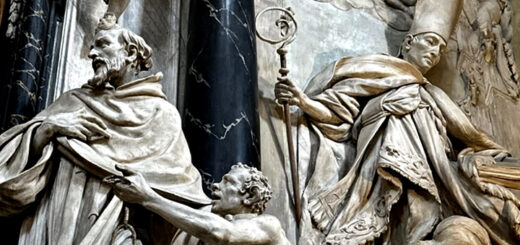Transsexuality taught me God's complicated love language
Reflections by Anna Magdalena, MtF*, published on the website The Catholic Transgender (USA) on 17 June 2014, freely translated by Damiani Michele
My relationship with transsexuality has taught me a lot about God's love. From a quote from Return to Me, one of my favorite films: “It is to those with the strongest character that God assigns the most difficult challenges. Now you can take it as a compliment." In high school, I was very interested in Christian apologies that defend the faith with logic and reasoning.
When I faced atheistic questions, I always had Catholic answers ready to use, a kind of reply at hand to "throw at my adversaries" with arrogant confidence. The answer to the so-called "problem of pain" is of this kind, derived from a kind of story.
So, an atheist approaches me and asks me how I can believe in the good God with so much suffering in the world. “How could a loving God allow his children to suffer so much?” I promptly replied: “Imagine you are a bear caught in a trap, you are trapped and you don't know how to free yourself. In fact, you are completely mystified by the unusual metallic teeth that seem to emerge from the forest floor to devour your paw. In violent pain you are overcome by panic and frustration.
A merciful hunter passes by and sees you in difficulty. This person, having placed similar traps, knows how to release this device and the only way to open the vice is to further press your limb towards the inside of the trap.
He approaches you from behind trying to push your paw deeper into the device to unlock it and, being the bear that you are, you have no idea why he does this. You cannot understand the higher knowledge and its reasoning and all you feel is immense pain. Angry, you hit him violently, pushing him away and, every time he tries to help you, you push him away, thus remaining imprisoned."
In this metaphor, the hunter is God and the bear represents humanity. Like the bear, we cannot understand the Lord's motives and assume that the experience of pain is useless or cruel so we fail to see the redemptive divine action in suffering.
Now, from a certain point of view, I find that analogies like this are much too easy and insufficient for the real intensity of human suffering and it is for this reason that my interest in apologetic style debate has diminished. In this story, however, I think there is a fundamental point which (as well as in the Book of Job) is not simply the embarrassing difference in intelligence between God and man, but essentially the profound compassion of the Almighty towards being human. The dilemma lies not only in the hunter's intentions that go beyond the bear's understanding, but in the latter's inability to believe in the adventurer's benevolence.
Ironically, life's challenges are the determining proof of God's love. As Christians, “we boast even in tribulations, knowing full well that tribulation produces patience, patience a proven virtue and proven virtue hope. Hope does not disappoint, because the love of God has been poured into our hearts through the Holy Spirit who has been given to us” (Romans 5:3-5). Pain and suffering make us grow and this gives us hope not for the benefit we desire, but because we know that this progress comes from the love of God. The increase in our suffering proves that God asks us to improve and he requires this only because he loves us with indescribable intensity.
As followers of Christ, we need to remember how much He suffered. If He who suffered more than any other is the beloved son of God, how then can we complain about the absence of the Lord when we feel only a part of His pain? Fundamentally, how is it possible not to understand that this unites us to Christ and therefore to divine love?
“Dear brothers, do not be surprised to find yourselves in the midst of the fire of trial. There's nothing strange. Be happy, rather, because the more you participate in the sufferings of Christ, the more you will be able to rejoice with joy on the day when he manifests his glory to all men. Blessed are you if you are cursed and insulted, because you are Christians! It means that the glorious Spirit of God is upon you” (1 Peter 4:12-14).
If we receive countless blessings from God, it is a clear sign of the love He has for us. Although, we must always remember that even if we are subjected to endless tribulations, this is much more than a testimony of His love. “To everyone who has been given much, much will be asked; to whom much is entrusted, much more will be required" (Luke 12:48).
Being transsexual is not a disgrace; it is a stigmata. A sign of how bizarre, senseless and absurdly exceptional God's love for us is.
* MtF or M2F (Male to Female) indicates a person who makes a transition with his body from male to female.
Original text: God's tricky love language






